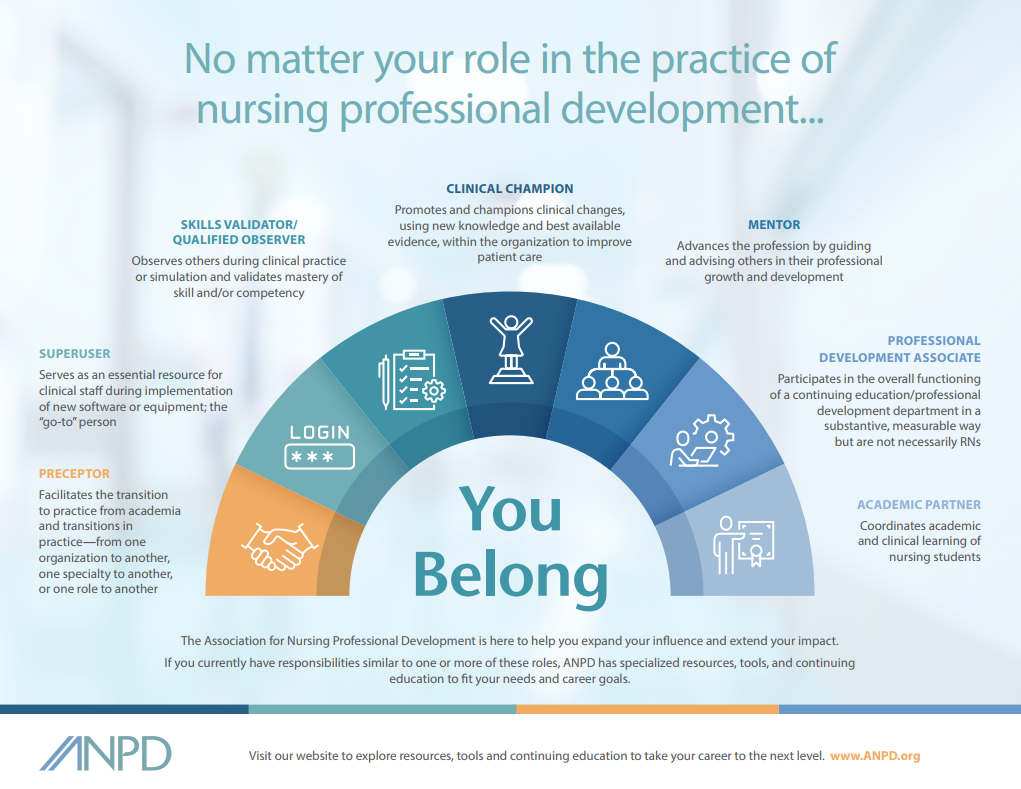Mentorship
Aspiring Nurses and Pre-Licensure Nursing Students
- Is there someone you particularly admire who is a nurse? A family member? A parent of a friend? Ask them about nursing. Tell them about your interests.
- Read and research! If you care about older individuals-read about aging.
- Volunteer to work in the hospital, or nursing home.
If you are in nursing school, how do you find a mentor?
Academic Support Services (for current, pre-licensure Nursing Students)
- Student Services/Admission at the Institution where you are accepted;
- Student Success Centers within your school that support academic skill development as well as peer interaction;
- Student Groups/Student Nurse Associations; and
- Academic Advisors-your advisor can be an invaluable mentor
- Sigma Theta Tau peer-peer mentorships. (e.g. graduating student paired with an experienced RN)
- Healthcare Careers clubs
New Nurses
A new nurse's personal experience of successful mentorship: “Now that six months have passed where you are there as a trainee, and now I'm beginning to feel part of the staff for real. I feel like I am almost there (Thrysoe, et al., 2011).”
Who do you want on your team? Hospitals are more likely to use a formal structure (see Residency programs).

Don’t be afraid to ask questions. Seek out a preceptor or mentor that you admire. Be patient with yourself.

Resources available for new nurses
- Peer Support for New RNs; Peer interaction;
- As a newly licensed Registered Nurse, additional sources of support may be available through:
- Participation in the Nurse Residency Program offered at the clinical site where you are employed. Learn More about NRPs or find additional resources.
- Preceptorship in the clinical area of employment.
- Support from supervisors.
- Nursing professional organizations such as Sigma Theta Tau.
- Sigma Theta Tau peer-peer mentorships.
New Nurse Educators in Healthcare Organizations
- As a new nurse educator, support and resources are provided as part of the onboarding and preceptorship process.
- Nursing professional organizations such as Association for Nursing Professional Development
- are involved in nurse residency programs;
- develop hospital-based mentorship programs;
- support both current nurses and mentors to improve organizational readiness;
- and, improve knowledge related to evidence-based practice.

Nurse Educators raise their own as well as peers’ knowledge and skill level through journal clubs, coaching, provider/nurse mentoring teams, and shared leadership groups composed of nurse educators and mentorship champions (Chan et al., 2019).

New Nurse Faculty: Academic Mentorship
A personal experience-the need for mentorship: “We are all familiar with the ‘reality shock’ experienced by new graduate nurses. Well for me, the transition from the clinical arena to the academic setting was also shocking. Sure, I had a PhD, but the chasm between knowing the theoretical and applying the practical was overwhelming” (Jacelyn et al., 2003).
Types of Mentorship
Traditional | Informal and-nontraditional | Group Mentorship |
|---|---|---|
Formal: Assignment of a mentor who may be a senior in the mentee's workgroup or topic area. Can also be assigned via learning styles or personality tests. | Informal: The mentee chooses a guide, to meet the goals of mentorship: directs new ideas, career goals, and a shared vision. | Team of mentors and mentees. Varies in formality; a group mentorship of 9-12 participants. One example of group mentorship is Constellation Group Mentorship. |
Structured: Identified goals, planned meetings and topics or expectations for each meeting. Vertical mentor to mentee relationship. | Unstructured: Goals, meetings and expectations are driven by the mentee. Horizontal-mentor to mentee relationship. | Generally structured |
Benefits: A mentor's experience and expertise drives the focus of the mentoring relationship. | Benefits: The mentee drives the focus of the mentoring relationship, with input from the mentor. | Benefits: The mentor does not have to meet all the needs of a single mentee; joint agreement on goals; greater opportunities for socialization for the mentee. |
Limitations: The direction of the mentorship is often directed by the mentor, which may not meet the needs of the mentee. | Limitations: Important skill sets may be missing from the partnership, if the mentee does not identify them as a goal. | Limitations: Coping with multiple viewpoints; need for focus. Undefined expectations, lack of commitment, poor communication, unmet needs. |

Many advanced degree graduates acknowledge that they lack the requisite skills to teach. If you are considering becoming a nurse-educator, take advantage of the many Maryland nurse educator’ programs available to RNs, i.e. Institute for Educators (University of Maryland), FAMI (Faculty Academy and Mentorship Initiative of Maryland) and Advanced-FAMI, (Salisbury University), and Towson University’s Clinician to Educator programs. Certification as a Nurse Educator or Clinical Nurse Educator is extremely helpful and available through ANCC.
